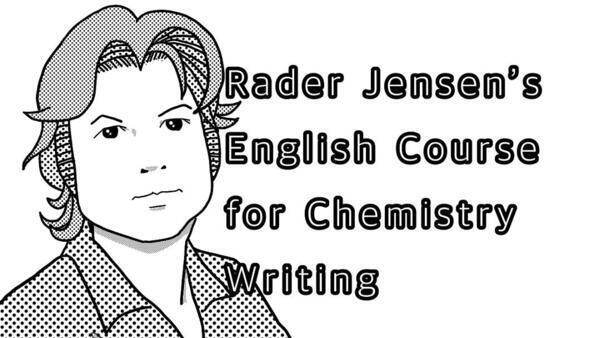[化学論文のための英語講座] 第30回:条件文または仮定文 Conditional and Hypothetical Sentences 2
2022年9月1日

(English version is here.)
前回に引き続き、条件文または仮定文です。
III. 仮定法過去
現時点では非現実的な状況を仮定して述べる場合には仮定法過去を使います。条件節は単純過去形に、主節は条件付現在形あるいは条件付現在進行形になります。条件付動詞には「would」がつきます。この文法形式は、目的、期待や願望を述べます。仮定が実現するかどうか確実ではありません。例文を見てみましょう。
1. If epimerization could be suppressed, the efficiency of this synthesis would be significantly improved.
訳文:エピマー化を抑制できれば、その合成の効率が大幅に改善できる。(期待、予想)
解説:今現在はできていないがこうなれば効率の向上が期待できます。
IV. 仮定法過去完了
過去を指し、現実と反することを述べる場合は仮定法過去完了を使います。条件節は過去完了形、主節には条件付完了形が使われます。
2. No reduction of the allylic moiety in eugenol was seen. If this reduction had occurred, the signal for the benzylic proton would have appeared as a triplet.
訳文:オイゲノールのアリル基還元は見られませんでした。もし還元されていたら、ベンジルプロトンの共鳴は三重線として現れたでしょう。(予想)
解説:この構文は「Aを行ったので結果Bになったが、もしCを行っていたら、結果Dになったと思われる」という感覚を与えます。条件節に過去完了形を、主節に条件付現在形あるいは条件付完了形を使い、過去のある時点から現在に向かって続いている状況を述べます。後悔を述べるためによく使われますが感謝を述べるためにも使われます。例文を見てみましょう。
3. If the initial strategy had been a success, it would have opened a route to both regioisomers. Thus, an alternate strategy was attempted.
訳文:最初の戦略が成功していれば、両方の位置異性体への道が開かれたでしょう。(しかし、最初の戦略が成功しなかった)そこで、別の戦略が試されました。(後悔、残念)
4. If it had not been for the diligent efforts of our students and research staff, the total synthesis would not have been completed.
訳文:学生や研究員の熱心な努力がなかったら、全合成は完了していなかったでしょう。(でも皆が努力を尽くしたので成功した)(感謝)
[補足1] 「will」、「would」、「could」、「should」、「might」、「may」の使い分けを理解すれば、条件文の使用が一層楽になります。意味の違いを見てみましょう。
will:結果は間違いない
would:結果が出たら、この通りになる、確率が高い
could:結果が可能である
should:結果が期待されている
might:結果が可能だと思われるが、確実ではない、許可
may:結果が可能であるが、確実ではない、許可
優秀な論文を書くためには、英語の条件文の種類を認識出来るようになると良いでしょう。
[補足2] Had this been はIf this had been と同じ意味になり、Ifを省略することができます。例えば、例文2は以下のように言い換えることが出来ます。
Had reduction occurred, the signal for the benzylic proton would have appeared as a triplet.
次回は「AllとSomeの使い方」です。
Conditional and Hypothetical Sentences
We are continuing the previous discussion.
III. Past subjunctive
When describing a hypothetical situation in the present, the conditional clause is in the simple past tense, and the main clause is in the conditional present or the conditional present progressive tense. The conditional verb appears with would. This grammatical structure shows goals, expectations, and desires. Whether this hypothesis is realized is not certain. Let us look at an example.
1. If epimerization could be suppressed, the efficiency of this synthesis would be significantly improved.
Explanation: This has not yet been done, but if done, improved efficiency could be expected.
IV. Past perfect subjunctive
When expressing a situation in the past that is contrary to reality, the past perfect subjunctive is used. In the conditional clause the past perfect tense and in the main clause the conditional perfect tense are used.
2. No reduction of the allylic moiety in eugenol was seen. If this reduction had occurred, the signal for the benzylic proton would have appeared as a triplet.
Explanation: This structure gives a feeling of "Because A occurred the result was B, however, if C had occurred it could be thought that D would have resulted". Using the past perfect tense in the conditional clause and the conditional present or conditional perfect in the main clause expresses a situation that has continued from a point in the past to the present. This is often used to express regret but it can also be used to express thanks. Let us look at some examples.
3. If the initial strategy had been a success, it would have opened a route to both regioisomers. Thus, an alternate strategy was attempted.
Explanation: Note that this sentence implies that the initial strategy was not a success and thus, an alternative was attempted. (regret)
4. If it had not been for the diligent efforts of our students and research staff, the total synthesis would not have been completed.
Explanation: This statement implies that the students and staff made diligent efforts and thus the total synthesis was a success. (thanks)
Supplement 1: Understanding the use of will, would, could, should, might, and may will make the use of conditional statements easier. Let us look at the differences.
will: The result is certain.
would: If there is a result, the outcome will be highly probable.
could: The result is possible.
should: The result is expected.
might: The result is thought possible or permitted, but not certain.
may: The result is possible or permitted but not certain.
In order to write an excellent paper, it would be good to recognize the types of conditional sentences in English.
Supplement 2: Had this been and if this had been have the same meaning. If can be omitted. For example, example 1 can be restated as follows.
Had reduction occurred, the signal for the benzylic proton would have appeared as a triplet.
At next time, we will discuss about the use All and Some.